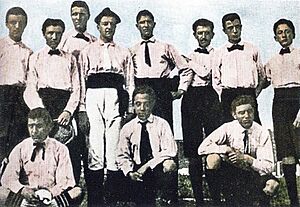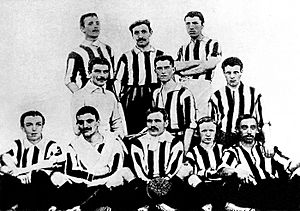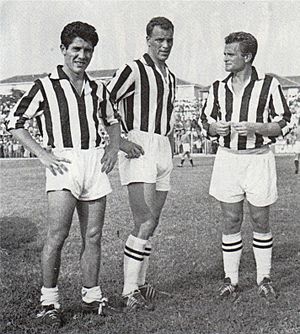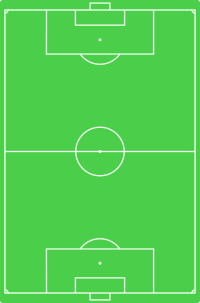History of Juventus FC facts for kids
The history of Juventus F.C. is all about a famous football club from Turin, Italy. It started way back in 1897 and has grown to be the most successful team in Italian football. Juventus is also one of the top football clubs in the world! The name Iuventūs means "youth" in Latin. An important international group called the International Federation of Football History & Statistics says Juventus was Italy's best club in the 1900s. They were also the second best European club during that time.
Contents
Early Years (1897–1918)
Juventus was first called Sport-Club Juventus. It was started in late 1897 by students from a school in Turin. Two brothers, Eugenio Canfari and Enrico Canfari, were among them. Two years later, the club changed its name to Foot-Ball Club Juventus.
The club joined the 1900 Italian Football Championship. Juventus played their first championship game on March 11, 1900. They lost 1–0 to Torinese.
In 1904, a businessman named Marco Ajmone-Marsan helped Juventus with money. This allowed them to move their training field to a better place. Back then, the team wore pink and black uniforms.
Juventus won their first league title in the 1905 Italian Football Championship. They played at their home ground, the Velodrome Umberto I. By this time, the club's colors had changed to black and white stripes. This look was inspired by an English team called Notts County.
In 1906, there was a disagreement at the club. Some staff wanted to move Juventus out of Turin. The club's president, Alfred Dick, was not happy about this. He left with some important players to start a new club, FBC Torino. This led to the Derby della Mole, a big rivalry between the two Turin teams. Juventus spent many years after this split rebuilding their team. They also survived through the First World War.
League Dominance (1923–1980)
In 1923, Edoardo Agnelli, a vice president of FIAT, became the club's president. A new stadium opened a year later. This helped Juventus win their second league title in the 1925–26 Prima Divisione. They beat Alba Roma 12–1 over two games.
In the 1930s, Juventus became a very strong team in Italian football. They were the first professional club in Italy. They also had fans all over the country. Juventus won a record five league championships in a row! Many of their players also played for the Italy national football team. This included stars like Raimundo Orsi, Luigi Bertolini, Giovanni Ferrari, and Luis Monti. These players helped Italy win the 1934 FIFA World Cup. As of 2022, Juventus has had the most FIFA World Cup champions from any club, with 27 players.
Juventus moved to the Stadio Comunale. But for the rest of the 1930s and most of the 1940s, they did not win many championships. After the Second World War, Gianni Agnelli became president. In the late 1940s and early 1950s, the club won two more league titles. They won the 1949–50 Serie A and then the 1951–52 Serie A.
For the 1957–58 Serie A season, two new attackers joined the team. They were Welshman John Charles and Italian Argentine Omar Sívori. They played alongside long-time player Giampiero Boniperti. In the 1959–60 Juventus F.C. season, Juventus won both the league and the cup. This is called a "double." They won the 1959–60 Serie A and the 1960 Coppa Italia final. Boniperti retired in 1961. He was the club's top scorer with 182 goals. This record stood for 45 years.
During the rest of the 1960s, the club only won the 1966–67 Serie A. The 1970s saw Juventus become even stronger in Italian football. Under former player Čestmír Vycpálek, they won the scudetto (league title) in the 1971–72 Serie A. They won it again in the 1972–73 Serie A. Players like Roberto Bettega, Franco Causio, and José Altafini became stars.
Later in the 1970s, they won the league three more times. Defender Gaetano Scirea was a very important player. The last two league wins were under coach Giovanni Trapattoni. He also led the club to their first big European title, the 1976–77 UEFA Cup. This helped Juventus keep dominating into the early 1980s.
European Stage (1980–1993)
The Trapattoni era was very successful in the 1980s. The club started the decade well, winning the league title three more times by 1984. This meant Juventus had won 20 Italian league titles. They were allowed to add a second golden star to their shirt. Juventus became the only Italian club to do this.
Around this time, Juventus players were getting a lot of attention. Paolo Rossi was named the best European player in 1982. This was after he helped Italy win the 1982 FIFA World Cup. He was also named the best player of that tournament.
Frenchman Michel Platini won the best European player award three years in a row (1983, 1984, and 1985). This is a record! Juventus is one of only two clubs to have players win this award for four years in a row. Platini scored the winning goal in the 1985 European Cup final against Liverpool. Sadly, this game was overshadowed by the Heysel Stadium disaster, a tragic event that changed European football.
That year, Juventus made history. They became the first club in Europe to win all three major UEFA competitions. After winning the 1985 Intercontinental Cup, they also became the first club to win all five possible international club competitions. They even won a sixth title in the 1999 UEFA Intertoto Cup.
Except for winning the close 1985–86 Serie A, the rest of the 1980s were not as successful. Juventus had to compete with Diego Maradona's Napoli and both Milan clubs, A.C. Milan and Inter Milan. Juventus did win a double in 1990. They won the 1989–90 Coppa Italia and the 1990 UEFA Cup final. This was under the guidance of former club legend Dino Zoff.
In 1990, Juventus also moved to their new home, the Stadio delle Alpi. This stadium was built for the 1990 FIFA World Cup. Even with the arrival of Italian star Roberto Baggio for a record transfer fee, the early 1990s were not very successful. Under coaches Luigi Maifredi and then Trapattoni again, Juventus only won the 1993 UEFA Cup final.
Renewed International Success (1994–2004)
Marcello Lippi became Juventus manager at the start of the 1994–95 Serie A season. His first season was a big success. Juventus won their first Serie A title since the mid-1980s. They also won the 1995 Coppa Italia final. The team had great players like Ciro Ferrara, Roberto Baggio, Gianluca Vialli, and a young Alessandro Del Piero.
Lippi led Juventus to win the 1995 Supercoppa Italiana and the 1995–96 UEFA Champions League. They beat Ajax in a penalty shootout after a 1–1 draw. Fabrizio Ravanelli scored for Juventus in that game.
The club kept getting stronger after winning the European Cup. More talented players joined, like Zinedine Zidane, Filippo Inzaghi, and Edgar Davids. At home, Juventus won the 1996–97 Serie A and then the 1997–98 Serie A. They also won the 1996 UEFA Super Cup and the 1996 Intercontinental Cup. Juventus reached two Champions League finals in a row but lost to Borussia Dortmund in 1997 and Real Madrid in 1998.
After being away for two and a half seasons, Lippi returned to the club in 2001. He signed big-name players like Gianluigi Buffon, David Trezeguet, Pavel Nedvěd, and Lilian Thuram. This helped the team win the 2001–02 Serie A, their first since 1998. They won it again in the 2002–03 Serie A. Juventus also played in an all-Italian 2003 UEFA Champions League final. But they lost to Milan on penalties after a 0–0 draw. After the next season, Lippi became the coach of the Italy national team. This ended one of the most successful periods for Juventus.
Calciopoli Scandal (2004–2007)
Fabio Capello became Juventus' coach in 2004. He led the club to win two more Serie A titles in a row. In May 2006, Juventus was one of several clubs involved in a big football scandal called Calciopoli.
In July, Juventus was sent down to Serie B for the first time ever. This meant they had to play in a lower league. The club also lost their 2004–05 Serie A title. The winner of the 2005–06 Serie A was given to Inter Milan, who had finished third. This decision was very controversial and debated.
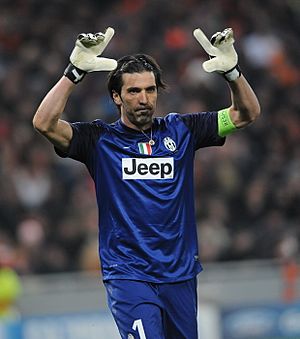
Many key players left Juventus after they were sent to Serie B. These included Thuram, star striker Zlatan Ibrahimović, and others. But some big-name players stayed to help the club. These included Del Piero, Buffon, Trezeguet, and Nedvěd. Young players from the youth team also joined the main squad.
Juventus won the Serie B championship even though they started with a points penalty. They quickly moved back up to Serie A. Del Piero was the top scorer in Serie B with 21 goals. They won the league after the 2006–07 Serie B season.
Later, in 2010, other clubs were also found to have broken rules. Juventus considered trying to get their lost titles back. The club continued to make appeals about the situation.
Return to Serie A (2007–2011)
After returning to Serie A for the 2007–08 Serie A season, Juventus hired Claudio Ranieri as manager. They finished in third place in their first season back. This meant they qualified for the 2008–09 UEFA Champions League. Juventus reached the group stages and even beat Real Madrid twice. But they lost to Chelsea in the knockout round.
Ranieri was fired after some bad results. Ciro Ferrara took over as temporary manager for the last two games of the 2008–09 Serie A. He was then made the full-time manager for the 2009–10 Serie A season.
Ferrara's time as manager was not successful. Juventus was knocked out of the 2009–10 UEFA Champions League and the 2009–10 Coppa Italia. They were also in sixth place in the league by January 2010. Ferrara was fired, and Alberto Zaccheroni became caretaker manager. Zaccheroni could not improve the team's performance. Juventus finished the season in seventh place in Serie A.
For the 2010–11 Serie A season, Andrea Agnelli replaced Jean-Claude Blanc as the club's president. Agnelli's first move was to replace Zaccheroni with Luigi Delneri. Delneri also failed to improve the team and was fired. Former player and fan favorite Antonio Conte was named as Delneri's replacement. In September 2011, Juventus moved to their new home, the Juventus Stadium. It has been known as the Allianz Stadium since 2017.
Nine Consecutive Scudetti (2011–2020)
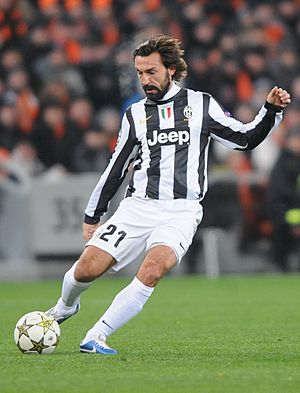
With Conte as manager, Juventus did not lose a single game in the entire 2011–12 Serie A season. In the second half of the season, they were in a close race with rivals Milan for first place. Juventus won the title on the 37th game day. They beat Cagliari 2–0, and Milan lost to Inter 4–2. After winning their final game against Atalanta 3–1, Juventus became the first team to go a whole season unbeaten in the 38-game format.
In the 2013–14 Serie A season, Juventus won their third league title in a row. They set a record with 102 points and 33 wins. This was the club's 30th official league championship. They also reached the semi-finals of the 2013–14 UEFA Europa League. They were knocked out at home by ten-man Benfica. This meant they missed playing in the 2014 UEFA Europa League final at their own Juventus Stadium.
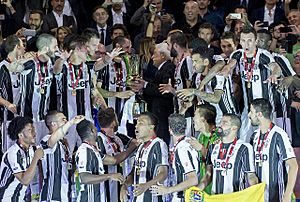
In the 2014–15 Serie A season, Massimiliano Allegri became manager. Juventus won their 31st official title, making it four in a row. They also won their record tenth Coppa Italia. They beat Lazio 2–2 in the 2015 Coppa Italia final, completing a domestic double. The club also beat Real Madrid to reach the 2015 UEFA Champions League final against Barcelona in Berlin. Juventus lost the final against Barcelona 3–1.
In the 2016 Coppa Italia final, the club won the title for the 11th time. This was their second win in a row. They became the first team in Italy to win both the Serie A and Coppa Italia in back-to-back seasons.
In the 2017 Coppa Italia final, Juventus won their 12th Coppa Italia title. They beat Lazio 2–0. This made them the first team to win three Coppa Italia titles in a row. Four days later, on May 21, Juventus became the first team to win six Serie A titles in a row. In the 2017 UEFA Champions League final, their second Champions League final in three years, Juventus lost 1–4 to Real Madrid.
In the 2018 Coppa Italia final, Juventus won their 13th title. This was their fourth in a row, extending their record for successive Coppa Italia titles. Juventus then won their seventh consecutive Serie A title, extending their record even further. In the 2018 Supercoppa Italiana, Juventus beat Milan 1–0 to win their eighth title. In April 2019, Juventus won their eighth consecutive Serie A title, setting another record.
After Allegri left, Maurizio Sarri was appointed manager for the 2019–20 Juventus F.C. season. Juventus were confirmed 2019–20 Serie A champions. This was an amazing milestone of nine league titles in a row!
Recent History (2020–Present)
On August 8, 2020, Sarri was fired as manager. This happened one day after Juventus was knocked out of the 2019–20 UEFA Champions League. On the same day, former player Andrea Pirlo was announced as the new coach. He signed a two-year contract.
In the 2020 Supercoppa Italiana, held in January 2021, Juventus won their ninth title. They beat Napoli 2–0. Inter Milan won the 2020–21 Serie A, ending Juventus' run of nine titles. Juventus finished fourth in the league, which allowed them to play in the Champions League next season. In the 2021 Coppa Italia final, Juventus won their 14th title.
On May 28, Juventus fired Pirlo. They announced that Allegri would return as manager after two years away. He signed a four-year contract. After losing to Inter Milan in the 2022 Coppa Italia final, the 2021–22 Juventus F.C. season was the first since 2010–11 where the club did not win a trophy.
In the 2022–23 season, Juventus earned only three points in the Champions League group stage. This was their lowest score ever in that competition. They finished third in their group and moved to the Europa League. They were eventually defeated by Sevilla in the Europa League semi-final in May 2023.
On November 28, 2022, the entire board of directors resigned. This included Andrea Agnelli as president and Pavel Nedvěd as vice president. Agnelli's time as president was the most successful in the club's history, with 19 titles won. Exor, the club's main owner, appointed Gianluca Ferrero as the new chairman.
Two days later, Juventus was given a penalty of 15 points. This was because of an investigation into financial rule breaking. This penalty was harsher than what was first suggested. It caused a lot of anger among Juventus fans. The decision was later changed on April 20, 2023. But Juventus then received a new penalty of ten points on May 22.
See also
 In Spanish: Historia de la Juventus de Turín para niños
In Spanish: Historia de la Juventus de Turín para niños
- Football records in Italy
- Nazio-Juve
- Timeline of association football
- UEFA club competition records and statistics
 | Leon Lynch |
 | Milton P. Webster |
 | Ferdinand Smith |


